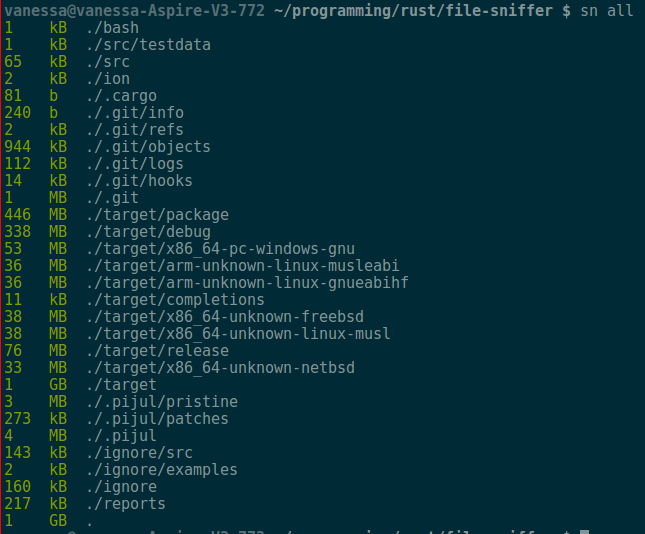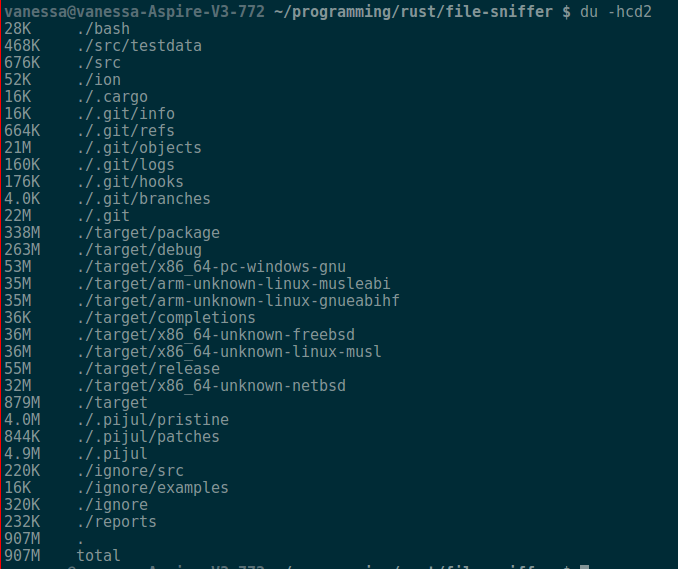If you do a significant amount of programming, you'll probably end up with
build artifacts scattered about. sn is a tool to help you find those
artifacts.
sn is also a replacement for du. It has far nicer
output, saner commands and defaults, and it even runs faster on big directories
thanks to multithreading.
The easiest way to install is to download a binary from the releases page.
If your platform doesn't have binaries, get cargo. Then:
bash
$ cargo install tin-summer
Make sure you are on nightly; otherwise
bash
$ rustup run nightly cargo install tin-summer
After setting BASH_COMPLETIONS_DIR or FISH_COMPLETIONS_DIR, you can install the
bash or fish features like so:
bash
$ cargo install --features fish tin-summer
Note that this might need to be run as root, depending on your setup.
To list directory and file sizes for the current directory:
$ sn f
To get a list of directory sizes concurrently, excluding version control:
$ sn p --exclude '\.git|\.pijul|_darcs|\.hg'
To get a sorted list of the 12 biggest directories in $DIR:
$ sn sort $DIR -n12
To search current directory for directories with build artifacts:
bash
$ sn ar
To look for artifacts or directories containing artifacts that occupy more than 200MB of disk space:
bash
$ sn ar -t200M
To turn off colorized output:
bash
export CLICOLOR=0
dusndu when used with the --exclude flag.| Directory Size | Tool | Command | Time |
| --------- || ---- | ------- | ---- |
| 600MB | sn | sn p | 60.74 ms |
| 600MB | sn | sn d | 99.92 ms |
| 600MB | du | du -hacd2 | 88.28 ms |
| 4GB | sn | sn p| 185.2 ms |
| 4GB | sn | sn d | 271.9 ms |
| 4GB | du | du -hacd2 | 195.5 ms |
| 1GB | sn | sn p | 36.68 ms |
| 1GB | sn | sn d | 42.90 ms |
| 1GB | du | du -hacd2 | 35.53 ms |
| 700MB | sn | sn p | 91.05 ms |
| 700MB | sn | sn d | 176.3 ms |
| 700MB | du | du -hacd2 | 153.8 ms |
| 7MB | sn | sn p | 19.48 ms |
| 7MB | sn | sn d | 12.72 ms |
| 7MB | du | du -hacd2 | 10.13 ms |
These commands are all essentially equivalent in function, except that sn p
may use more threads than sn a or du. Results were obtained using Gabriel Gonzalez's bench
tool.


Currently, sn looks for files that either have an extension associated with
build artifacts, or executable files that are ignored by version control. It also looks for "build
directories", like .stack-work, elm-stuff, etc. and if it finds a
configuration file like tweet-hs.cabal, it considers all their
contents to be build artifacts.
The following is a list of languages sn artifacts has been tested with.
The intent is to support basically anything, so feel free to open a PR or start an issue.